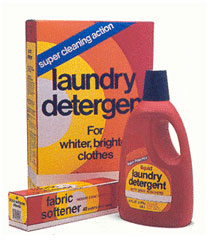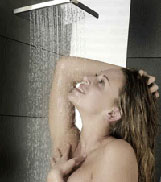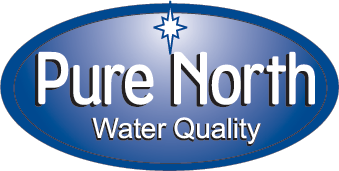Water Facts

Hard Water requires the use of more soap and detergents
The quality of your water has a direct relationship to how much money you spend on cleaning products for your home. Have you ever poured detergent into your clothes washer and wondered why very few soap bubbles formed? That’s because the mineral hardness in your water is making it impossible for lather to form. Most detergent manufactures assume your water is hard. That’s why over 60 percent of detergents are nothing more than chemical water softeners. That means you’re getting less SOAP for your money!
Solution
With a Pure North Water Softener, soap usage can be dramatically reduced. When conditioned and softened water has no mineral hardness to react with or overcome, soaps create more lather and have greater cleaning power. According to recent study, approximately 12 – 14% of a families’ grocery shopping budget is spent on soaps and cleaners.

Hard Water reduces the efficiency of water-using appliances
Hard water reduces the efficiency of water-using appliances. Take your water heater, for example. Scale build-up from hard water coats the heater’s coils. In one study where electric water heaters were operated and tested exclusively on hard water, they consumed nearly 21.5 % more energy than water heaters using softened water. And gas water heaters consumed 30% more energy. Also, appliances operating with hard water may need to be serviced or replaced more often. Discover how much hard water is costing your family in energy costs and appliance wear and tear.
Solution
The solution is a Pure North Water Softener. This system will condition all of the water coming into your home. That means there will be no scale forming minerals to clog your pipes and your appliances will be free of solidified rock. Most appliance manufacturers recommend the use of a home water conditioner to help appliances operate more efficiently.

Hard Water decreases the life of fabrics
Washable clothing is a very large expense in the home. Your clothing wears out 30% faster in hard water. Have you ever hung your clothes out to dry and later found them hard and stiff? That is because soap scum (like the ring left in your bathtub) is left behind in your clothes, making the fibers very hard and brittle. But we don’t commonly hang clothes out to dry anymore. Rather, gather them up and throw them into the dryer. So while your clothes are in the dryer, they rub together; like rubbing a metal file on metal, and the little brittle fibers break off, thus wearing your clothes out thirty percent faster. That is why the lint trap in your dryer is always full.
Solution
With a Pure North Water Softener, you’ll find that your clothes will look brighter, your towels softer, and clothing will last 30% longer.

Soap scum and water scale increase cleaning time
According to a University study, the average person spends more than six hours a month cleaning tap water spots, scaling, streaks and soap scum in the home.
Solution
With a Pure North Water Softener, your tub, toilets and fixtures will take less time to clean, and stay clean longer, because hard water scaling and soap residue have been eliminated. Everything in your home can be cleaned with a light wipe. This can save you many, many hours of labor, not to mention numerous dollars for cleaning products that will be eliminated.

Hard water causes dry skin and clogged pores
When you step out of the shower, does your skin feel dry, tight, and itchy? Just like the soap scum that is left behind in the tub, soap residue remains on our bodies after bathing. When we bath, we cover ourselves with soap scum and then we grab a bath towel and grind more of it into our 2.5 million pores as we dry off! At night, we slide into sheets and the soap residue is there, too.
Solution
Wouldn’t it be great to step out of the tub and feel soft and smooth all over? You can with softened water. With softened water, You’ll enjoy bathing & showering more than ever. Your skin will feel soft and soap residue will rinse off completely, thus allowing your natural oils to flow. In fact, many softener owners find they use very little lotion or moisturizers after purchasing a Pure North Water Softener.
Soft Water Facts You Should Know
- When your water is soft, you use much less soap and fewer cleaning products
- Skin and hair retain natural softening and moisturizing agents
- Using soft water can reduce water heating bills up to 29%
- Soft water also requires 50% to 75% less detergent to do laundry and dishes
- The average savings are $10 -$15 a month per person.
- Hard water can cause a build up of scale from mineral deposits
- Your clothes last longer and remain brighter if they are washed in soft water
- When you bathe with soft water, your skin and hair will feel softer
Pure North’s Water Facts
- More than 2 billion people on earth do not have a safe supply of water
- Canadians are one of the greatest consumers of water in the world.
- A Canadian uses an average of 326 litres of water each day for household and gardening purposes (in contrast, a person living in Sub-Saharan Africa typically uses 10-20 litres each day
- Flushing the toilet actually takes up the largest amount of this water.
- Average residential indoor water use in Canada is as follows: toilet 30%; bathing and showering 35%; laundry 20%; drinking and cooking 10%; cleaning 5%
- A five-minute shower with a standard showerhead uses 100 litres of water, whereas a five-minute shower with a low-flow showerhead uses 35 litres
- To brush your teeth you use 5 to 7.5 liters of water
- For an automatic dishwasher 35 to 45 liters of water is used
- We pay approximately $2.00 for 1,000 liters of municipal water supply
- Bottled water can be up to 1000 times more expensive than tap water
- A small drip from a faucet can waste as much as 75 liters of water a day
